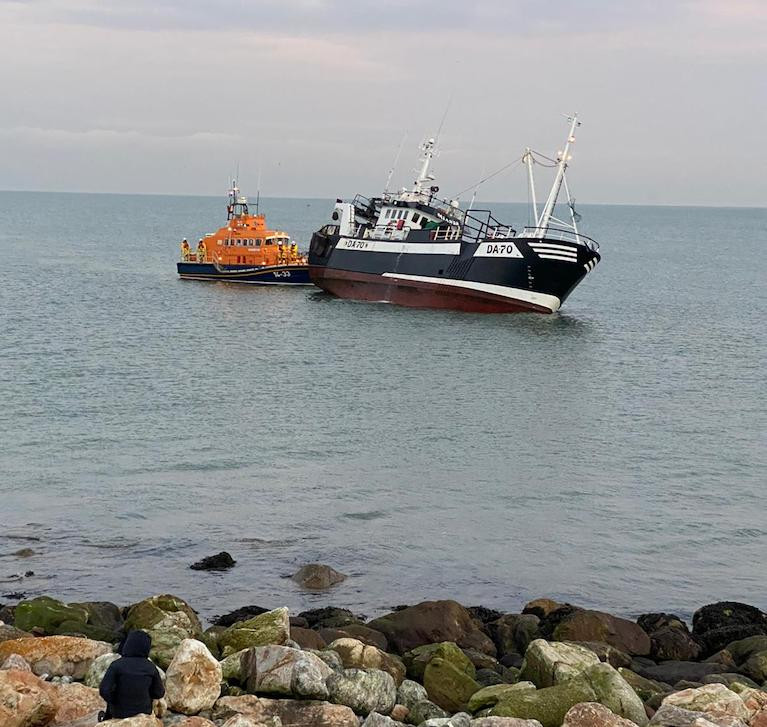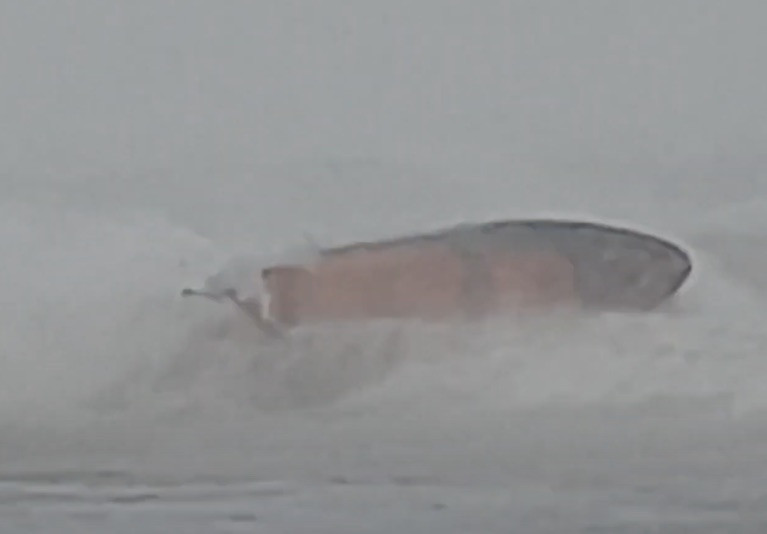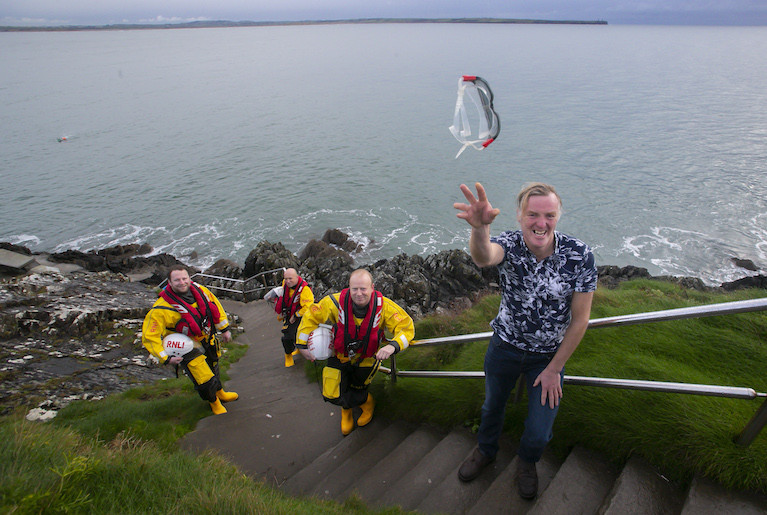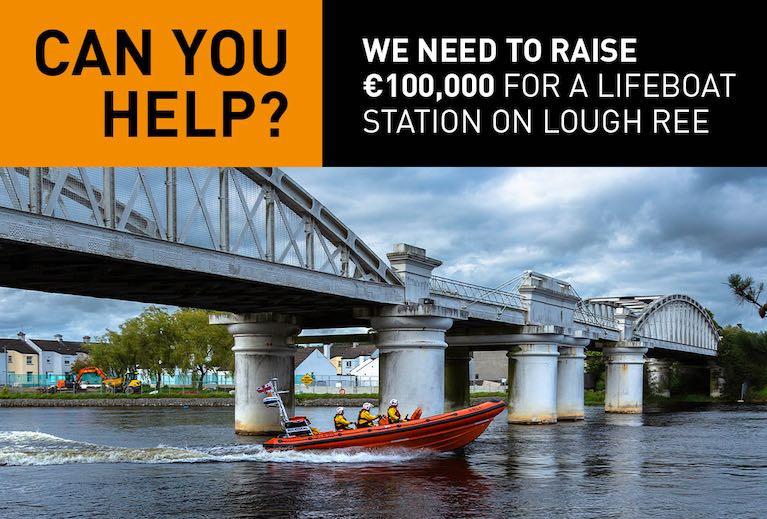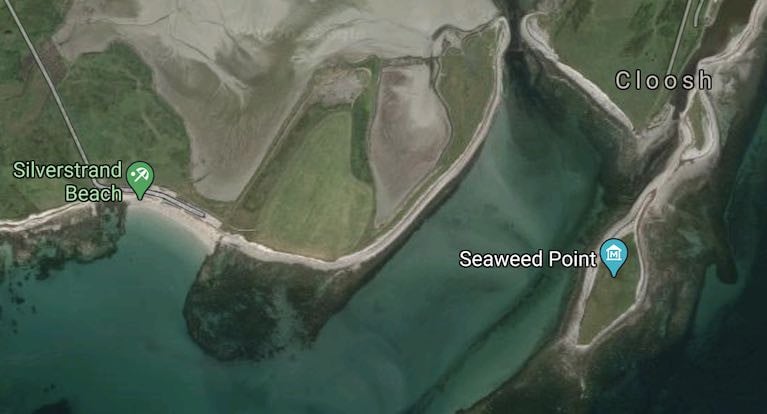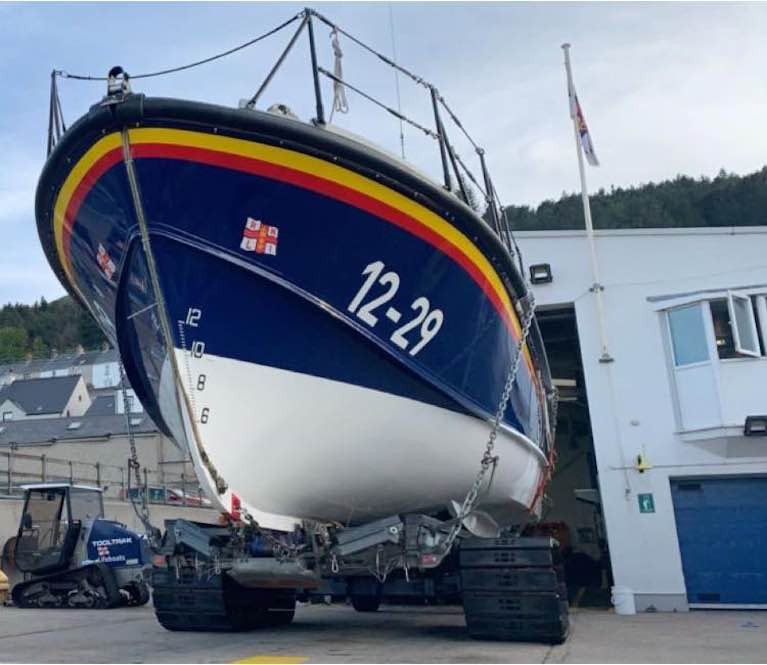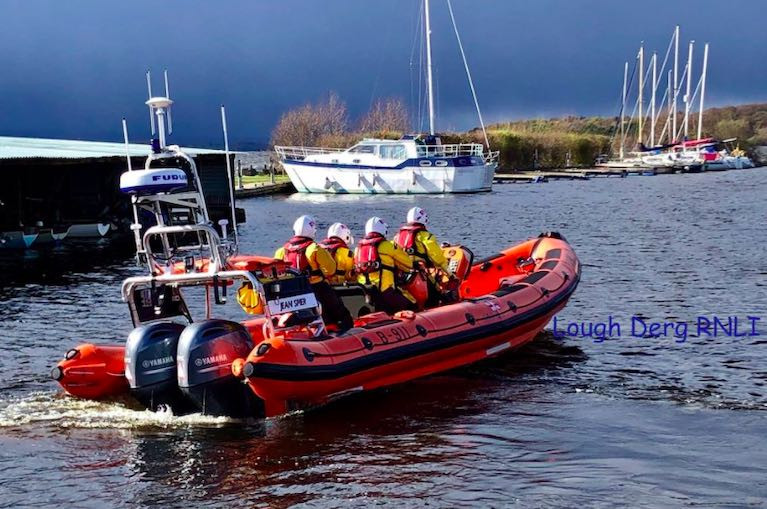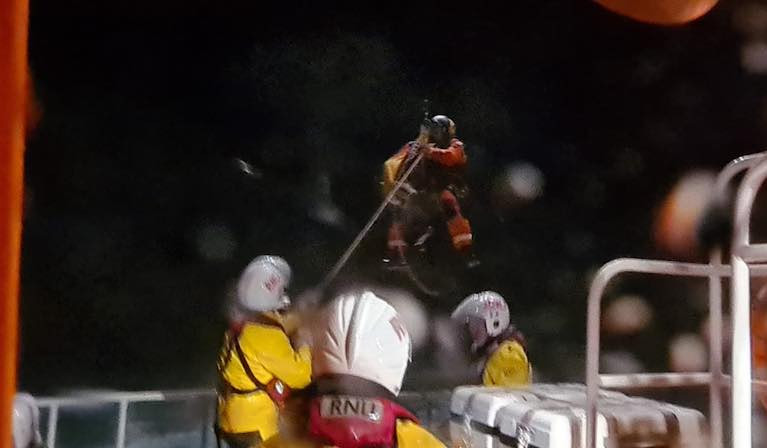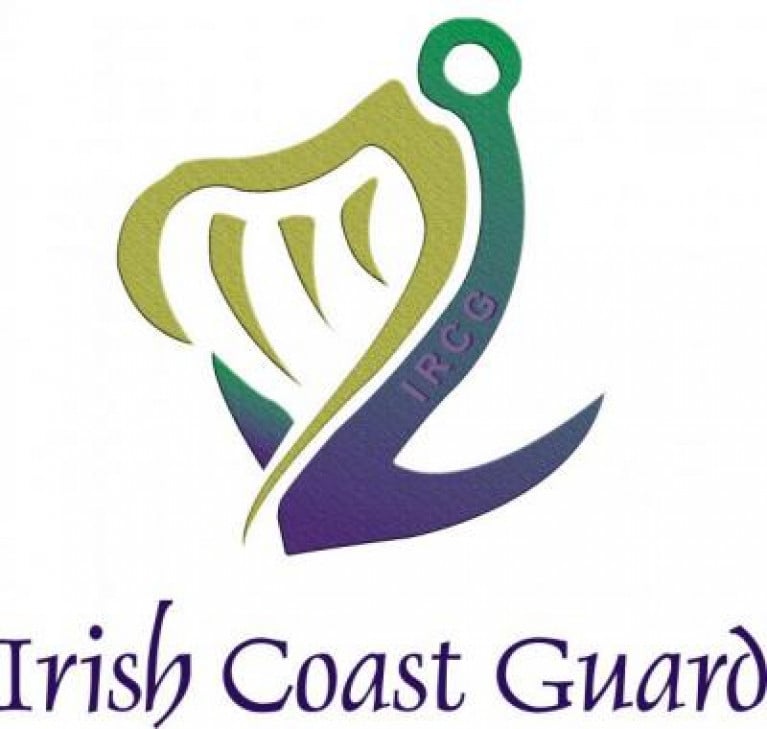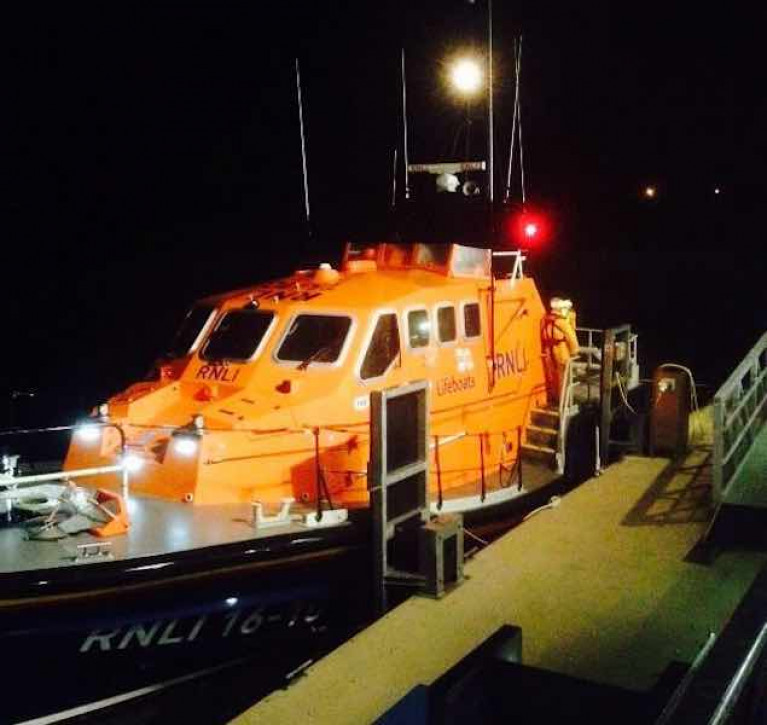Displaying items by tag: Lifeboat
Howth RNLI Rescue Fishing Trawler & Crew After Running Aground
Howth RNLI launched the all-weather lifeboat to rescue a fishing trawler, six people, onboard after it ran aground on rocks in Balscadden Bay, at Howth in County Dublin.
The RNLI pagers sounded at 4.12 pm on Thursday 7th January to reports of a fishing trawler aground just outside Howth Harbour in Balscadden Bay. The all-weather lifeboat was launched and was on the scene in a matter of minutes.
The trawler was hard around and listing to one side. The lifeboat crew assessed the fishing trawler and deemed it safe to put a tow line aboard. Fred Connolly, Howth RNLI Lifeboat Coxswain carefully navigated the all-weather lifeboat in the shallow water and the volunteer crew got a tow line aboard the stricken trawler.
 The tide was rising and the lifeboat eased the trawler off the rocks and into deeper water
The tide was rising and the lifeboat eased the trawler off the rocks and into deeper water
The tide was rising and the lifeboat eased the trawler off the rocks and into deeper water. The trawler was brought back to the safety of Howth Harbour.
The Howth Lifeboat and volunteer crew returned to Howth station and stood down at 5.50 pm.
 The fishing trawler aground in Balscadden Bay Photo: Annraoi Blaney
The fishing trawler aground in Balscadden Bay Photo: Annraoi Blaney
Speaking following the callout, Ian Malcolm, Howth RNLI Deputy Launching Authority said: ‘Our volunteer lifeboat crew were pleased to be able to quickly respond and tow the fishing vessel to the safety of Howth Harbour. Our Lifeboat volunteers train regularly to prepare for situations just like this’’
The crew on the Howth RNLI Trent Class All Weather lifeboat were; Fred Connolly - Coxswain, Ian Sheridan - Mechanic, Killian O’Reilly, Ian Martin, Aidan Murphy, Stephan Mullaney and Ronan Murphy.
New Video Features Five of the Most Dramatic RNLI Rescues
A new video featuring five of the most dramatic RNLI rescues of 2020 has been released today as the lifesaving charity braces itself for another busy Christmas:
Figures for the last 10 years for the festive period (Christmas Eve to New Year’s Day) show that RNLI lifeboats in Ireland launched 122 times, with their volunteer crews coming to the aid of 56 people including four lives saved.
The incredible footage shows how the RNLI’s volunteer lifeboat crews will go to the aid of anyone who needs their help, whatever the weather and no matter how dangerous the conditions.
Among the Irish rescues, the video features:
- Three lifeboats from Dunmore East, Kilmore Quay and Rosslare Harbour battling for hours in strong winds and breaking seas to save a 4,000-tonne coaster and nine crew from being washed onto the rocks.
- A crew member from Portrush RNLI jumping from their all-weather lifeboat into stormy seas to rescue a teenager who got into difficulty while jumping into the sea off rocks.
The RNLI has launched its Christmas Appeal and is asking for support so the charity’s lifesavers can continue to save lives at sea: Please visit - RNLI.org/Xmas
Survivor Backs RNLI Christmas Appeal After Charity Sees Traditional Fundraisers Cancelled
A man whose life was saved by the RNLI off the Waterford coast earlier this year, has urged people to support the RNLI’s Christmas appeal. Michael Power from Tramore had been sea swimming when he got into serious difficulty. Pulled unconscious from the water by Tramore RNLI, the lifeboat crew never gave up on him and despite his family being called to his bedside to say goodbye, Michael went on to make a full recovery. Now in thanks to the volunteer lifeboat crew that saved his life, Michael is calling on people to support his lifesavers after the RNLI have seen a drop in income as traditional fundraising activities had to be cancelled due to the pandemic.
In January this year, Michael Power set off for a swim along the Guillamene cove in Tramore, County Waterford. A regular swimmer Michael kept his head down and was aware of other swimmers in the vicinity. Not keeping an eye as he usually did on the coastline, he eventually became aware that he was not moving even after increasing his strokes. He had become caught in a rip current and could not get out of it. He tried to get to safety, but he was rapidly losing energy and began to panic. Michael subsequently learned that he had developed Hypothermia before slipping into a coma. He has no memory of the man who raised the alarm from the shore or the RNLI lifeboat crew who were on scene minutes later to find him face down in the water and unresponsive. Onlookers from the cliff watched in shock as the volunteer crew pulled him lifeless from the water and commenced CPR. His next memory is waking up in hospital with his family having been called in to say goodbye.
Now Michael wants to thank his rescuers by calling on people to support the RNLI’s Christmas appeal and donate to the charity that saves lives at sea and on inland waters. Michael has also been down to the lifeboat station to thank his rescuers in person, along with his grateful family.
Commenting on his near-drowning Michael said, ‘I am known as the miracle man around here now. I am so grateful to my rescuers and that I am here to be able to tell my story. I know the lifeboat crew who rescued me personally, as I live locally and swim in the sea regularly, so I can only imagine how difficult it was for them to pull me out of the sea in that condition. The doctors told me that I should not have survived, and that the lifeboat crew undoubtedly saved my life. So, this is my way of saying thank you.’
‘When I visited the lifeboat station, they presented me with my swimming cap and googles that they had kept safe, unsure if I would survive but unwilling to dispose of them. It was an extremely emotional moment and I have plans to frame them as a reminder of that day that I can’t even remember. I know there are so many families out there who have reason to be grateful to the RNLI and mine certainly have, they are tremendous people.’
The RNLI have launched their Christmas appeal this year as so many traditional community fundraising events such as raft races, open days and sea swims have had to be cancelled due to the coronavirus restrictions. This year the charity has spent funds on PPE, including face masks, gloves and thousands of litres of hand sanitiser. This is money the charity hadn’t budgeted for but needed to be spent to keep its lifesavers and the public protected during the coronavirus crisis.
Lough Ree RNLI Looking to Raise €100k for New Base at Coosan Point
Coosan Point on Lough Ree is home to one of Ireland’s busiest lifeboat crews. But they operate from temporary facilities and the RNLI say they urgently need a permanent, new base to continue their lifesaving missions.
The Institute is seeking donations to help fund a new, purpose-built lifeboat station and are aiming to raise €100k.
Lough Ree volunteer crews have been rescuing people from the lake’s 28km stretch of inland water since 2012, launching more than 370 times and helping over 1,060 people.
The permanent station near the existing slipway at Coosan Point – crucial for the efficient launching and recovery of the lifeboat will include
- Secure boathouse for lifeboat, launch tractor and trailer
- Crew training and meeting rooms
- Changing facilities, showers and WCs
- Offices and operations room
- Workshop and fuel storage facilities
RNLI Appeal to Walkers Not to Try to Swim Ashore if Caught by Tide After Galway Rescue
Galway RNLI's deputy launching authority (DLA) has appealed to people not to try to swim ashore if caught in a tidal situation while walking.
Paul Carey, DLA at the Galway station, issued his appeal after the rescue of a man and a woman who were caught by spring tides in Galway on Sunday evening.
The two had walked out to Seaweed Point between Blackrock and Silverstrand which is accessed at low tide.
The spring tide took them by surprise and submerged their access back, according to the station.
Galway RNLI lifeboat launched at the request of the Irish Coast Guard at 4.43pm after the alarm was raised by a member of the public.
"Unaware that the lifeboat was on its way, one of the two took the decision to swim ashore to call for help," the station says.
"He was met at the shore by a member of the lifeboat shorecrew and confirmed there was another person still stranded, which was relayed to the lifeboat.
"Upon arrival, a lifeboat crew member searched the area, located the other casualty who was sheltering from the winds, and took her onboard the lifeboat.
"Both were brought back to the lifeboat station at Galway docks where they were assessed. They did not require medical attention," the station says.
“We would never recommend anyone to attempt to swim ashore," Mr Carey said afterwards.
"If people do get caught in circumstances like this they should remain on land and not attempt to swim ashore until the rescue services arrive," he advised.
The Galway RNLI helmsman Dave Badger was with crew Brian Niland, Dave McGrath and Ross Forde on the callout.
RNLI Newcastle locates Missing Swimmer in Dundrum Bay (Updated)
Just three days after the return of Newcastle RNLI station's D class lifeboat, Eliza, after a refit, in the late afternoon yesterday, Belfast Coastguard requested the immediate launch of the both the station's Lifeboats to reports of an overdue swimmer in the vicinity of the Inner Dundrum Bay area at at Murlough Beach.
The swimmer had got separated from his friend. Coastguard teams from Newcastle, Kilkeel and Portaferry, police officers from Newcastle and Downpatrick and the Coastguard helicopter from Valley, in Wales were also involved in the search.
Dundrum Outer Bay lies east of Newcastle in south County Down. The Outer Bay is a wide gently shelving bay, and the Inner Bay is an estuarine lagoon, connected to the Outer Bay by a tidal channel.
The search extended from Murlough Beach, around Dundrum inner bay to Tyrella Beach in difficult conditions with a strong, cold onshore wind.
Over two hours after he went missing the swimmer was found by Police Officers on the beach at Ballykinler Army Base, having been swept away from Murlough and across the bay before coming ashore. The man was taken to hospital.
The rescue was coordinated by Belfast Coastguard Operations Centre.
This story was updated on November 17 with up to date details of the rescue operation
Lough Derg RNLI Feature on BBC TV Series 'Saving Lives at Sea'
The volunteer lifeboat crew at Lough Derg RNLI will be taking to the small screen again on Tuesday 17 November at 8 pm, as they feature in the seventh episode of the BBC TV series Saving Lives at Sea.
Real-life rescue footage captured on their helmet cameras gives a frontline view of how the charity’s lifesavers risk their own lives as they go to the aid of those in danger at sea and strive to save everyone.
Now in its fifth series, the 10-part documentary showcases the lifesaving work of the RNLI’s volunteer lifeboat crews and lifeguards from around Ireland and the UK. The series will air on BBC Two on Tuesdays at 8 pm, as well as being available on BBC iPlayer following broadcast.
Real rescue footage is accompanied by interviews from the volunteer lifeboat crews and lifeguards alongside the people they rescue and their families.
In a forthcoming episode, to be aired on Tuesday 17 November at 8 pm on BBC Two, viewers will see Lough Derg RNLI rescue two kayakers who got into extreme difficulty in rough weather, alongside rescue stories from their colleagues at other stations and beaches around our coasts.
Owen Cavanagh, Helm of the Lough Derg RNLI lifeboat crew featured in the 17 November episode, says: ‘It’s great that with the Saving Lives at Sea programme our supporters can see what we do out on a Shout, and from the comfort of their own home too. This year the pandemic has presented RNLI volunteers with additional challenges, but we’ve continued to maintain a 24/7 search and rescue service. And due to Covid19, fundraising events have been cancelled, with a drop in our charitable income. Without the generous support and donations from the public, we wouldn’t be able to save lives at sea. We need their support more than ever during these challenging
times.’
During 2019, RNLI lifeboat crews around Ireland and the UK rescued
- 9,412 people, saving 211
- lives, while the charity’s lifeguards aided
- 32,207 people and saved 118
- lives on some of the UK’s busiest beaches.
Castletownbere RNLI lifeboat was launched last night at 22:54 to go to the assistance of a seriously will fisherman on board a fishing vessel off the West Cork Coast.
Castletownbere RNLI lifeboat was tasked by Valentia Coastguard Radio at 22:46 last night to go to the assistance of a 27-metre locally-registered fishing trawler, with six persons on board, located two miles south of Mizen Head which reported that a crewman had suddenly become seriously ill.
The lifeboat was launched within minutes under the command of Coxswain Dean Hegarty and located the vessel west of Sheep’s Head.
Conditions on-scene were difficult with a three metre swell and 25-knot south-westerly winds. Two attempts were made to transfer the casualty from the fishing vessel to the lifeboat but were unsuccessful due to unfavourable conditions. The lifeboat then escorted the trawler to just inside the mouth of Castletownbere harbour where the casualty, a man in his late forties, was transferred to the lifeboat in calmer waters.
 The Coastguard helicopter 115 lowered a winchman onboard the Castletownbere RNLI
The Coastguard helicopter 115 lowered a winchman onboard the Castletownbere RNLI
The Shannon-based Sikorsky Irish Coastguard helicopter Rescue 115 was tasked and met with the lifeboat in Bantry Bay. The helicopter lowered a winchman and the casualty was successfully transferred to the helicopter for immediate evacuation to Cork University Hospital.
Commenting on the callout Castletownbere RNLI Lifeboat Deputy Launching Authority, Brendan O’Neill, complimented the crew on its rapid response to the call-out and thanked the coastguard for its cooperation in making this call-out successful.
Coastguard & Lifeboats Assisting Drifting Cargo Vessel off Waterford
In a major mobilisation of rescue services off the south-east coast this evening, the Irish Coast Guard is coordinating assistance being provided to a cargo vessel that has lost power off the Waterford Harbour.
The Coast Guard said in a statement this evening, The ship, which is carrying a cargo of coal reported to MRCC Dublin earlier this afternoon that it had lost power.
RNLI Lifeboats from Dunmore East, Kilmore Quay and Rosslare, as well as the Waterford based Coast Guard Helicopter and Fethard Coast Guard unit, were immediately tasked. A Waterford based tug is expected on scene shortly after 6 pm.
 The track of the 99-metre ship which was on its way to New Ross from Germany when it lost power off the Waterford coast.
The track of the 99-metre ship which was on its way to New Ross from Germany when it lost power off the Waterford coast.
The Coast Guard has described the situation as stable and the vessel with Lifeboat assistance is drifting in an Easterly direction pending arrival of the Tug.
More news on this as it becomes available
Baltimore RNLI in Medical Evacuation from Sherkin Island
Baltimore RNLI was called out to provide a medical evacuation late last night (Sunday 18 October) from Sherkin Island off the coast of Baltimore, West Cork.
The volunteer lifeboat crew launched their all-weather lifeboat at 11.39 pm, following a request from the Irish Coast Guard to provide medical assistance and evacuation to a female who had sustained an injury to her arm.
The Baltimore all-weather lifeboat crew along with two HSE paramedics arrived at Sherkin Island pier at 11.47 pm. The voluntary lifeboat crew brought the casualty onboard the lifeboat. After an initial assessment was carried out by the HSE paramedics, a lifeboat crew member assisted in the administration of casualty care and the casualty was able to return home. The lifeboat then departed Sherkin at 00.07 am and arrived to the station in Baltimore at 00.18 am.
There were five volunteer crew onboard the lifeboat, Coxswain Kieran Cotter, Mechanic Micheal Cottrell and crew members Ronnie Carthy, Sean McCarthy and David Ryan, along with two paramedics from the HSE. Conditions in the harbour during the call out were calm with a south-easterly force 5 wind, which created heavy runs at Sherkin pier.



























